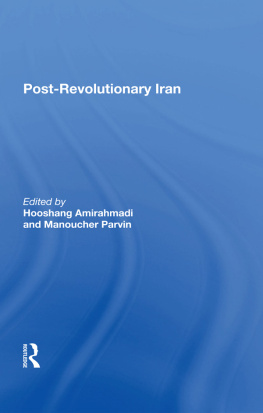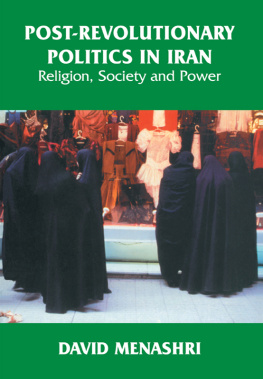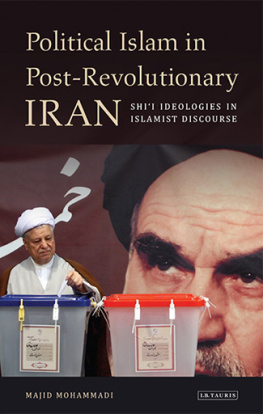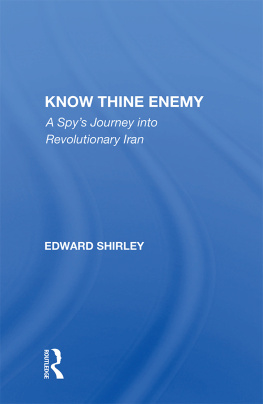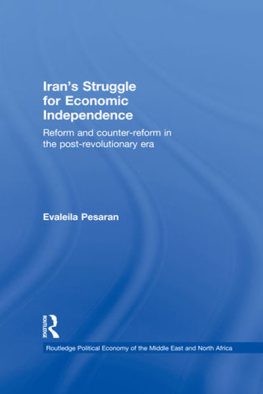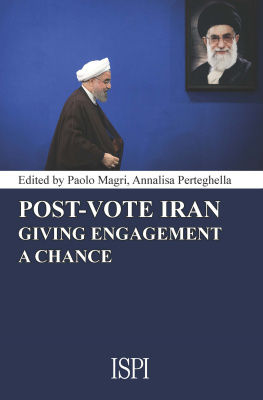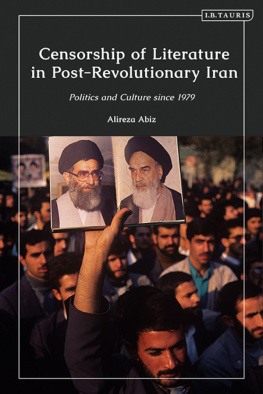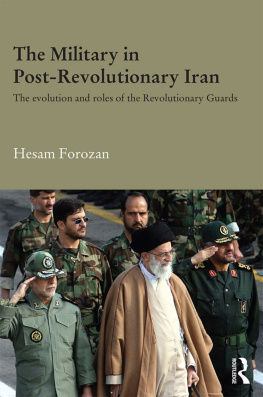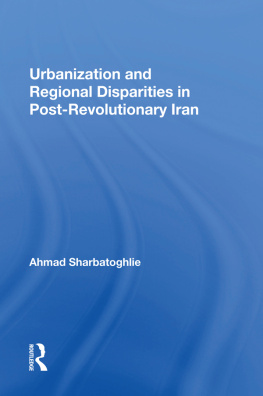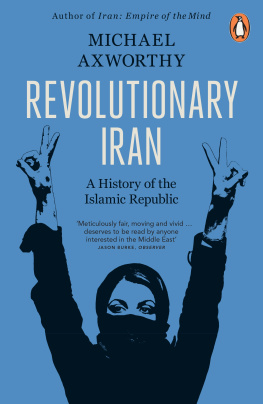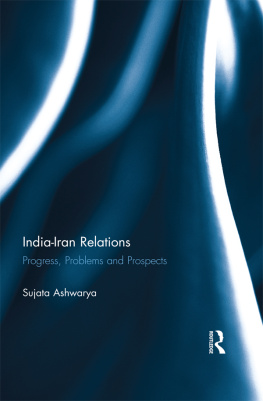Post-Revolutionary Iran
Published in cooperation with the Center for Iranian Research and Analysis
First published 1988 by Westview Press
Published 2019 by Routledge
52 Vanderbilt Avenue, New York, NY 10017
2 Park Square, Milton Park, Abingdon, Oxon OX14 4RN
Routledge is an imprint of the Taylor & Francis Group, an informa business
Copyright 1988 by Taylor & Francis
All rights reserved. No part of this book may be reprinted or reproduced or utilised in any form or by any electronic, mechanical, or other means, now known or hereafter invented, including photocopying and recording, or in any information storage or retrieval system, without permission in writing from the publishers.
Notice:
Product or corporate names may be trademarks or registered trademarks, and are used only for identification and explanation without intent to infringe.
Library of Congress Cataloging-in-Publication Data
Post-revolutionary Iran/edited by Hooshang Amirahmadi and Manoucher
Parvin.
p. cm.(Westview special studies on the Middle East)
Includes index.
1. IranHistory1979- . 2. IranEconomic conditions1945
I. Amirahmadi, Hooshang, 1947- . II. Parvin, Manoucher.
III. Series.
DS318.8.P68 1988
955.054dc19
87-31700
CIP
ISBN 13: 978-0-367-28398-8 (hbk)
Contents
, Hooshang Amirahmadi
PART ONE
POLITICS AND IDEOLOGY
, Hamid Dabashi
, Val Moghadam
, Assef Bayat
, Nader Entessar
, Annabelle Srebemy-Mohammadi and Ali Mohammadi
PART TWO
FROM IDEOLOGY TO PRAGMATIC POLICY
, Sohrab Behdad
, Hooshang Amirahmadi
PART THREE
SOCIOECONOMIC TRANSFORMATIONS AND POLICIES
, Akbar Aghajanian
, Manoucher Parvin and Majid Taghavi
, Michaei G. Renner
, Mehrdad Valibeigi
PART FOUR
CONCLUSIONS
, Hooshang Amirahmadi
Most of the chapters in this book extensively utilize sources in native Persian language on post-revolutionary Iran. In some cases, the research is based on on-site observations. More than half of the chapters were originally presented at the 1985 conference of the Center for Iranian Research and Analysis (CIRA) held at Rutgers, The State University of New Jersey, and organized by Hooshang Amirahmadi. Others were written specifically for this volume.
The editors wish to thank those who helped in the publication of this book: Professors Donald Krueckeberg, Robert Beauregard, and Gregory Rose for reviewing certain chapters; Barbara Ellington, Christine Arden, and Paul Sprachman for reading the entire manuscript; Sonia Hamberg, Brenda Leonard, and Phyllis Blackhurst for administrative assistance; Lea Leadbeater, Samy Amer, and Zahra Beheshti for technical help; and Rahmat Tavakol, Manijeh Saba, Mahvash Saba, Sabine Malbranche, and Farhad Atash for assisting in the organization of the 1985 CIRA conference. The editors also greatly appreciate the assistance of Lynn Coffey-Edelman, who patiently typed the entire manuscript and helped in the final packaging of the book for publication.
Hooshang Amirahmadi acknowledges the financial and administrative support of the Rutgers International Programs for the 1985 CIRA conference. In this connection, special thanks are due to Dr. C. S. Whitaker, Henriette Cohen, and Connie Burke. The financial support of the Rutgers Research and Sponsored Programs in the publication of this book is also gratefully acknowledged. Manoucher Parvin acknowledges the Faculty Improvement Leave granted by the University of Akron.
The editors are also grateful to the members of CIRA for material and intellectual support of the Centers publications. CIRA is an independent, nonprofit, educational organization dedicated to generating, promoting, and publicizing scholarly research on Iran. The views expressed in the chapters that follow are those of the authors and do not reflect the views of the editors, of CIRA itself, or of those acknowledged for their help and support, including Rutgers, The State University of New Jersey.
Hooshang Amirahmadi
Manoucher Parvin
1
Introduction: From Ideology to Pragmatic Policy in Post-Revolutionary Iran
Hooshang Amirahmadi
Few revolutions have shocked the world with such intensity and created so many imponderable questions as the Iranian Revolution of 1979. The rapid speed at which the Revolution took place and its predominantly Islamic character still remain sources of mystery even to well-educated students of Iran. Equally obscure are the multiple roots of the Revolution and its largely spontaneous, but well-orchestrated, mass character. Although a growing literature has shed light on many aspects of these and other similar questions, our knowledge of the state and society in post-revolutionary Iran and the probable future direction of the Islamic Republic in matters of domestic transformations and international relations remains largely inadequate.
Aside from the scarcity of information, the major factors contributing to this problem include the conflicting policies and practices of the Islamic government and their diverse interpretations by scholars and political analysts. Although the inconsistencies in government policies are rooted in factional politics, the ongoing war with Iraq, and the unsettled state of the Revolution, disagreements among observers of Iran arise largely from ideological differences. Consequently, a generally accepted analysis of post-revolutionary Iran has not yet emerged.
The primary purpose of this book is to analyze transformations in the ideological, political, and socioeconomic structures of post-revolutionary Iran and to discuss government policies in order to shed light on the nature and direction of the state and society in the Islamic Republic. Clearly, the complexity of the issues discussed in this book as well as the ideological differences among the authors prevent a definite conclusion from emerging. In addition, the analyses are constrained by inadequate information about the inner workings of the Islamic Republic and about the many causal-consequential networks affecting post-revolutionary Iran.
Nevertheless, the chapters, most of which were written by young scholars with fresh insights and some of which are based on recent on-site research, present interesting, even controversial, conclusions. Three major themes recur throughout the chapters: (1) the enormous changes in the material and intellectual aspects of life in post-revolutionary Iran when compared to pre-revolutionary times; (2) the severe domestic and foreign-policy problems requiring immediate solutions; and (3) the gradual shift of the Islamic state from its initial ideological commitments to more pragmatic policies.
Among the many implications of these and other findings, one is crucial: The state must balance pragmatism and its initial revolutionary promises in order to maintain its stability. This may prove difficult, though not impossible, given the resource constraints, the war, the lack of a unified front for attacking the enormous socioeconomic and political problems, conflict with imperialism, and dependency on the world market. Various chapters also indicate why these and other factors are increasingly forcing the Islamic Republic to abandon its initial ideals and accept technocratic solutions to domestic and international problems.

